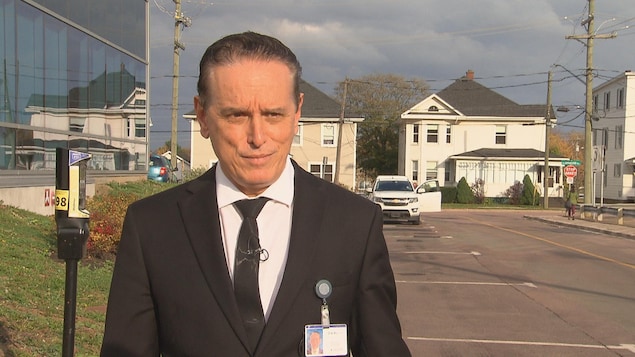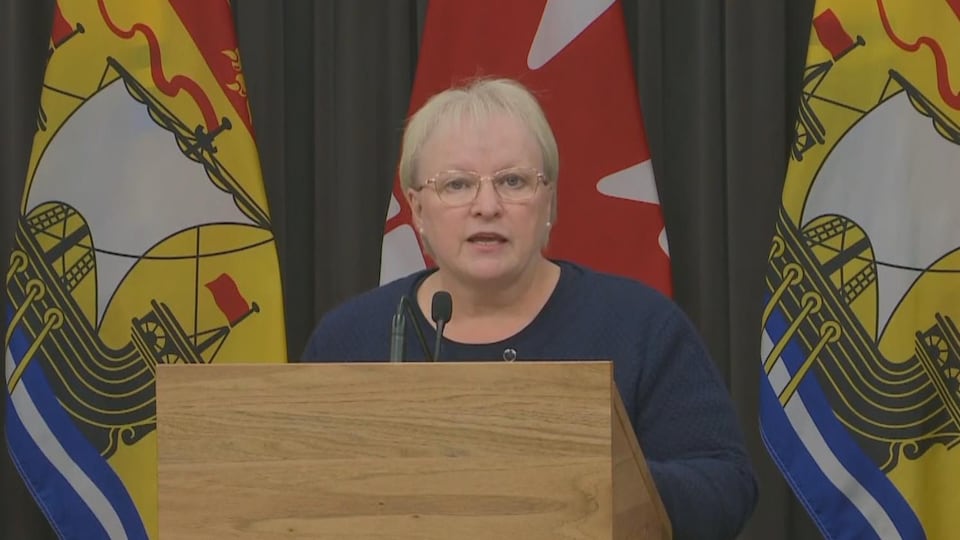It’s not a theory I invented
Dr. Alier Marrero said in an interview Wednesday afternoon.
Often, unfortunately, in complex diseases [où il y a de la] The difficulty of diagnosing, especially when these diseases are new, is that there is a lot of misunderstanding and education that needs to be done
, It is to explain.
Whoever is behind the majority of diagnoses for this neurodegenerative disease still believes there is a new syndrome affecting New Brunswickers.
why there [aurait] Lots of cases and many cases that look like this, increasing over the years and then more and more cases
, He said. There is also a clinical context, we see many other patients, often very young, rapidly developing symptoms that also include elements suggestive of prion disease or neurotoxic disease.
Dr Alier Marrero also specifies that although his office is the starting point for the majority of cases, experts from elsewhere in the country have Analyze the data and result in a case definition that Public Health shares with all New Brunswick physicians
.
It also determines that it works In close collaboration with the Canadian Creutzfeldt-Jakob Disease Surveillance System and Public Health Canada
.
Doubts about illness … and about Dr. Marrero
Dr. Alier Marrero made the remarks moments after the end of a briefing on the unknown disease, as New Brunswick’s health minister. Dorothy Shepard claims she doubts his existence.
I think public health has good reason to suspect an unknown neurological disease […] I will not speculate on the results of the investigation [clinique] In progress, but I think we’re nearing the end
Wednesday said.
Public Health also shared the results of the first epidemiological examination – a questionnaire, conducted over the phone, to which only 34 of the 48 known cases responded – which concluded that there was no evidence to suggest an environmental cause or the presence of a toxin in food making people sick.
The minister and other public health officials insisted that nearly all known cases of the disease had been reported by a single neurologist. They didn’t call him, but Dr. Alier Marrero. It is he who has reported 46 cases out of 48 known cases. The remaining cases were reported by two other physicians.
The minister also said that we discovered Gaps in case reporting processes
, which would be He allowed some situations to escalate, often without supervision
.
Faced with these questions, a group of six neurologists were tasked with reviewing the files of patients believed to have the unknown disease. Their role is to provide an impartial perspective on the matter. The report of this independent clinical examination will be published at the beginning of the new year.
The county also tightened criteria that allow a patient to be considered part of a case pool. From now on, the identification of new cases must be approved by two specialist doctors. Minister Dorothy Sheppard also sent a letter to the new Federal Minister of Health, Jean-Yves Duclos, informing him of the following: Challenges
In scanning and changes to some actions.
Public Health in New Brunswick isn’t alone in suspicious of the disease. The day before, he called a neurologist who had reviewed the autopsies of some patients believed to have had the unknown disease. He argued that these patients were misdiagnosed, that they suffer from known diseases (such as Alzheimer’s or cancer), and nothing indicates the presence of a new, unknown disease.
These autopsy reports – such as the Public Health Epidemiological Inquiry report – emphasize that it is impossible to draw conclusions about a new disease.
It is therefore impossible to infer its existence, but it is also impossible to say that it does not exist.
Dr. Marrero denounces the publication of autopsies
Dr. Alier Marrero questions the conclusions drawn from the autopsies performed by neurologist Dr. Gerard Janssen.
As he said to himself concerned
And Surprised
To see that conclusions were reached with Some reports on selected autopsies of some patients
.
He deplores that the results of these autopsies were disclosed to the media without his consent when it comes to his patients.
I think autopsy fights shouldn’t be a question in the media
, he added.
In a written statement sent Thursday evening, a spokesperson for Public Health Canada responded to a neurologist’s questions regarding the publication of the autopsy results.
Public Health Canada was not aware of Dr Janssen’s publication on the Canadian Association of Neurologists website and did not endorse the use of autopsy data for these purposes.
, wrote company spokeswoman Charlene Suleiman.
Dr. Alier Marrero believes it is important to continue investigating this mysterious disease, to give answers to his patients and their families.
As a physician, I feel that we must stand up for our patients and we must bring hope. We must also, at the level of our health systems, remove the alarms a little and, on the contrary, cooperate
, he thinks.
What role did Dr. Marrero play in the rest of the investigation?
Everything indicates that the neurologist will not share the result of the investigation.
Comments made by Health Minister Dorothy Sheppard as well as documents obtained by CBC/Radio Canada under the Access to Information Act show that Dr. Alire Marrero played a key role in the early stages of the investigation. Then her role has changed over the past few months.
In April, Minister Dorothy Sheppard said the Committee on Unknown Neurological Diseases was chaired by Dr. Alire Marrero.
Then, in May, when the county set up an expert panel to review the neurologist’s work, the minister hinted that Dr. Alier Marrero would continue to play an important role.
But the minister’s confidence in Dr Alier Marrero appears to have waned this week. Dr. Marrero is not conducting this investigation, Public Health is conducting this investigation
, she told reporters.
On the question of the possibility that Dr. Alier Marrero may have made errors in his diagnosis, the vice president of medical affairs for the Vitalité Health Network, where the neurologist works, avoided the answer directly.
With the information released today, we will need to sit down with the doctor to review his records and discuss this with him.
Dr. Natalie Banville said: We cannot comment before discussing it with him.
A mysterious evil in a note
Last March, following a Radio Canada report, New Brunswick Public Health notified residents that it was closely monitoring a group of patients who appeared to have an unknown disease.
The Neurological disease of unknown origin
It affects about fifty people in the Acadian Peninsula and the Moncton region. Patients have similar symptoms (dementia, unexplained muscle wasting, visual hallucinations, behavioral changes).
His patient charts were sent to the Canadian Creutzfeldt-Jakob Disease Surveillance System, where symptoms were similar. Creutzfeldt-Jakob disease is a rare and fatal form of neurocognitive disorder. It is caused by the presence of abnormal prion proteins that are toxic to the brain.
However, test results confirm that these patients do not have Creutzfeldt-Jakob disease or a known form of prion disease.
Nine people diagnosed with the unknown neurological disease have died since 2019.
With information from Nicholas Steinbach and Carissa Donkin, CBC

“Subtly charming problem solver. Extreme tv enthusiast. Web scholar. Evil beer expert. Music nerd. Food junkie.”



